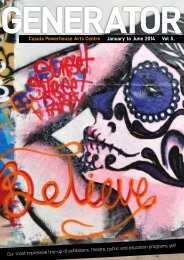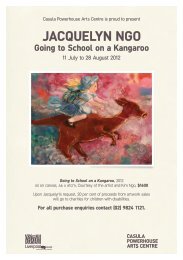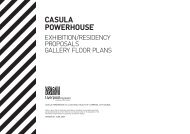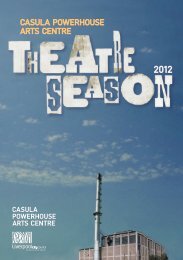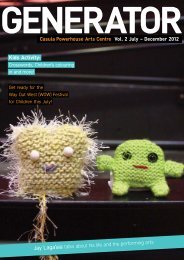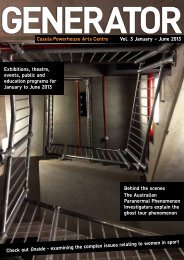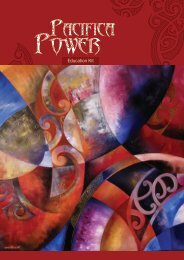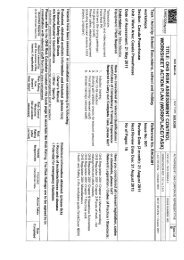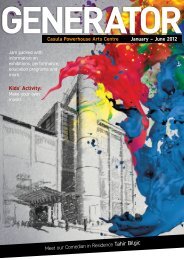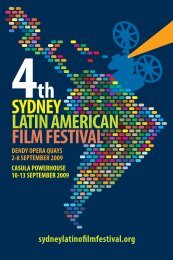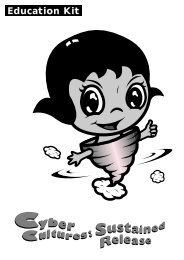No Added Sugar Catalogue - Casula Powerhouse
No Added Sugar Catalogue - Casula Powerhouse
No Added Sugar Catalogue - Casula Powerhouse
Create successful ePaper yourself
Turn your PDF publications into a flip-book with our unique Google optimized e-Paper software.
CASULA POWERHOUSE ARTS CENTRE PRESENTS<br />
12 MAY–8 JULY 2012<br />
EXHIBITION CATALOGUE<br />
CASULA POWERHOUSE ARTS CENTRE<br />
WWW.CASULAPOWERHOUSE.COM<br />
NAS005 - Exhibition <strong>Catalogue</strong> bp.indd 1<br />
8/05/12 1:10 PM
AS-SALAMU ALAYKUM<br />
PEACE BE UPON YOU<br />
AND WELCOME TO<br />
NO ADDED SUGAR<br />
<strong>Casula</strong> <strong>Powerhouse</strong> Arts Centre is proud to present<br />
<strong>No</strong> <strong>Added</strong> <strong>Sugar</strong>, the ground-breaking visual arts<br />
exhibition that is the outcome of our national initiative,<br />
the Australian Muslim Women’s Arts Project.<br />
Our project vision has been an expansive one,<br />
developed over a number of years, with community<br />
engagement and artist development critical to<br />
the outcome. This process now culminates in this<br />
exhibition that brings together eight diverse artist<br />
projects, grounded by the creative words of artist<br />
Eugenia Flynn. The eight-week exhibition season<br />
is accompanied by weekly public events.<br />
The 18 artists—from Melbourne, Sydney and Canberra—<br />
have become part of a dynamic national network.<br />
They committed themselves to an intensive process,<br />
which included two artist laboratories in 2011, as<br />
well as their own independent community cultural<br />
engagement projects, all with the support of <strong>Casula</strong><br />
<strong>Powerhouse</strong> Arts Centre. The project as a whole is a<br />
significant model of contemporary cultural production.<br />
CASULA POWERHOUSE ARTS CENTRE<br />
1 CASULA ROAD, CASULA<br />
WWW.CASULAPOWERHOUSE.COM<br />
CONTACT US:<br />
02 9824 1121<br />
RECEPTION@CASULAPOWERHOUSE.COM<br />
WRITTEN AND PRODUCED BY:<br />
RUSAILA BAZLAMIT: CURATOR, NO ADDED SUGAR<br />
ALISSAR CHIDIAC: PRODUCER, NO ADDED SUGAR<br />
DESIGN AND PHOTOGRAPHY BY:<br />
EQUILIBRIUM DESIGN<br />
<strong>Casula</strong> <strong>Powerhouse</strong> Arts Centre acknowledges the<br />
participation of community members who were part of<br />
the artists’ cultural engagement hubs in three Australian<br />
cities. We are grateful for the long-term support of<br />
the Project Working Party—professional women from<br />
Queensland, New South Wales and Victoria, who were<br />
on board before the Project Plan was even developed.<br />
The artworks in this exhibition were truly created<br />
with the artists being critically aware of engagement<br />
with people and place —as well as with their<br />
inner selves. For the visitor, we hope that <strong>No</strong><br />
<strong>Added</strong> <strong>Sugar</strong> opens up fresh creative spaces and<br />
provides opportunities for the unexpected.<br />
ONE : INTRODUCTION<br />
NAS005 - Exhibition <strong>Catalogue</strong> bp.indd 2-1<br />
8/05/12 1:10 PM
EUGENIA FLYNN<br />
ASIYA SIAN DAVIDSON<br />
CROOKED RIB ART<br />
FATIMA KILLEEN<br />
IDIL ABDULLAHI<br />
MARWA CHARMAND<br />
MEHWISH IQBAL<br />
RESALA ALAZZAWI<br />
ZEINA IAALI<br />
NAS005 - Exhibition <strong>Catalogue</strong> bp.indd 2-3<br />
8/05/12 1:10 PM
CURATORIAL<br />
STATEMENT<br />
<strong>No</strong> <strong>Added</strong> <strong>Sugar</strong> came out of the process of the<br />
Australian Muslim Women’s Arts Project. PROCESS,<br />
therefore is the key word that has structured the<br />
exhibition. That process has manifested through the<br />
two main themes of the exhibition: ‘Engagement’<br />
and ‘Self-Determination’, creating an organic<br />
flow of concepts and visuals with deeper and<br />
meaningful consciousness to people and place.<br />
The notion of “sweetness” is irrelevant to <strong>No</strong><br />
<strong>Added</strong> <strong>Sugar</strong>, it is not about sweetness, or<br />
bitterness for that matter. It is about rawness,<br />
these Muslim women creating art and expressing<br />
their ideas as they choose, imagining the world<br />
will listen as they want to be listened to.<br />
As Cultural Community Engagement is an integral<br />
aspect of this project, two spaces of the exhibition are<br />
dedicated to the work created by the communities.<br />
Marsden Gallery and Kids Gallery feature some<br />
of the work that was produced in that process,<br />
acknowledging and respecting the input these people<br />
brought to this project and to the art-making process.<br />
The other theme of this project is “Self-Determination”.<br />
This means that the artists had brought up issues<br />
and worked with concepts that they have chosen.<br />
They didn’t have to conform to any pre-determined<br />
conceptual or visual frameworks that are usually<br />
placed on them as Muslims, as women, as Australians,<br />
as artists or a mix of these four elements.<br />
The engagement process that developed between the<br />
artists and the communities they chose has influenced<br />
all involved. The participants have engaged with the<br />
artists in various creative expression activities where<br />
they have produced canvasses, clay-pots, bags and<br />
paintings as well as sharing their stories and life<br />
experiences. This interaction has influenced and<br />
inspired the artworks that the artists have produced.<br />
Artists have chosen various themes, from exploring<br />
deeper understanding of faith to challenges facing<br />
young Muslim girls, working with objects of memory<br />
and creating visible dialogues, from refugees’<br />
experience of enforced separation to children’s tales<br />
of migration, personal stories of war and raw feelings<br />
of divorce. In a parallel dimension, poetic words<br />
by Eugenia Flynn have opened up the Indigenous<br />
connection to Home, Place, Land and Sea.<br />
This is not your ‘expected’ Muslim Women’s Arts<br />
exhibition. This is a brave world determined by<br />
these artists’ honest creative imagining. As you<br />
enter <strong>Casula</strong> <strong>Powerhouse</strong> Arts Centre break<br />
away from any representational predictions you<br />
have and allow yourself to embrace the journey<br />
these artists are offering to take you through.<br />
FIVE :<br />
CURATORIAL STATEMENT<br />
NAS005 - Exhibition <strong>Catalogue</strong> bp.indd 4-5<br />
8/05/12 1:10 PM
EUGENIA<br />
FLYNN<br />
B. 1982, ADELAIDE,<br />
SOUTH AUSTRALIA<br />
LIVES AND WORKS IN<br />
MELBOURNE, VICTORIA<br />
Eugenia Flynn is a Larrakia, Tiwi, Chinese and Muslim<br />
woman. From a young age she was actively involved in<br />
Indigenous cultural work in Adelaide and she is now<br />
the Student Programs Manager at the Wilin Centre<br />
for Indigenous Arts at the University of Melbourne.<br />
Born in Adelaide, to an Aboriginal father from the<br />
<strong>No</strong>rthern Territory and a Chinese mother from<br />
Malaysia, Flynn converted to Islam in 2002. She<br />
is a critical thinker and writer, using her unique<br />
life experiences and perspectives to infuse her<br />
writing with strength, power and critique.<br />
During the two intensive Artist Labs at <strong>Casula</strong><br />
<strong>Powerhouse</strong> Arts Centre in 2011, Flynn grounded the<br />
context of the work with a sense of ‘Place’, asserting<br />
culture as an integral part of everyday life. She was<br />
a provocateur, challenging the artists and laying a<br />
foundation of concepts, ideas and philosophies that<br />
underpin the Project. Her role as critical supporter<br />
is embodied within the <strong>No</strong> <strong>Added</strong> <strong>Sugar</strong> exhibition<br />
through her poetic words – in a sense, holding,<br />
grounding, challenging and embracing the work<br />
of the visual artists within the gallery spaces.<br />
Her work brings a literary dimension to the exhibition<br />
and Flynn is committed to grounding the visitor to<br />
‘Country’ and to Indigenous connections to ‘Home’<br />
and ‘Place’ and ‘Land’ and ‘Sea’. Conceptually cradling<br />
the work of the other artists, Flynn’s lyrical journey<br />
may also push boundaries of comfort to invoke<br />
new meanings, understandings and imaginings.<br />
I SIGH A THOUSAND SIGHS<br />
E X H A L E D B R E A T H,<br />
THAT SOMETIMES ECHOES FROM THE PAST<br />
I SWEAR I HEAR MY MOTHER’S BREATH,<br />
WITHIN MY OWN<br />
T H E L O N G S I G H S M O S T L Y<br />
CAN I WHISPER TO YOUR HEART, DEAR FRIEND<br />
A BISMILLAH, IN THE NAME OF GOD A SPIRITUAL OPENING OF OUR HEARTS<br />
TO BEGIN THIS JOURNEY WITH GOD’S LOVE<br />
CAN I WHISPER IN YOUR EAR, DEAR FRIEND<br />
R E M I N D Y O U O F T H O S E , D E A R,<br />
AND THAT THIS<br />
NATION HAS<br />
BLACK HISTORY<br />
SPIRITUAL TIES TO LAND, MADE LAST<br />
G O N E P A S T<br />
Though subtle and seamless, the fluid action of Flynn’s<br />
poetic words within <strong>No</strong> <strong>Added</strong> <strong>Sugar</strong> manifest an<br />
innovative vision of contemporary cultures on this Land.<br />
AND CAN I TAKE YOUR HAND, DEAR FRIEND<br />
LEAD YOU ON THIS JOURNEY TOGETHER<br />
SHOW YOU INSPIRATION<br />
ON THESE WALLS<br />
IMAGINATIONS DESPITE ENCLOSURE<br />
SEVEN : EUGENIA FLYNN<br />
NAS005 - Exhibition <strong>Catalogue</strong> bp.indd 6-7<br />
8/05/12 1:10 PM
ASIYA SIAN<br />
DAVIDSON<br />
B. 1975, TASMANIA<br />
LIVES AND WORKS IN<br />
MELBOURNE, VICTORIA<br />
Asiya Sian Davidson is an artist who paints and<br />
draws by making intricate marks using pen, ink,<br />
glass paint, fingerprints and text. Davidson’s practice<br />
is informed by a love of semantics and exploring<br />
spaces beyond the limitations of language. Language<br />
itself is often a key to evoking sensations of the<br />
ambiguous, particularly semitic languages such as<br />
Arabic, which has an elaborate root system that<br />
provides layers of meaning to every expression. This<br />
kind of fluidity is sometimes forgotten in the modern<br />
world where we try to situate and fix our immediate<br />
reality into components that can be controlled and<br />
tamed. Davidson’s own art making explores these<br />
spaces of fluidity, the non-linear, the in-between.<br />
The work that Davidson has made for this exhibition<br />
explores the sacred play of opposites and of<br />
contradiction as it unfolds within subjective experience,<br />
and how agitation becomes catharsis. She has<br />
experimented with video performance for the first time<br />
and also worked with her familiar area of drawing,<br />
painting and installation. Her work is very detailed,<br />
consisting of many tiny, repetitive marks, patterns and<br />
text. There is a meditative quality to her art making<br />
process that, for Davidson, is a spiritual practice.<br />
In <strong>No</strong> <strong>Added</strong> <strong>Sugar</strong>, Davidson has created a video<br />
projection based on her own performance in an<br />
enclosed space titled There is no reality but the<br />
Reality. She also created a mixed media artist book<br />
titled Constellations/ Possibilities inspired by her<br />
community engagement. Davidson has created a<br />
mixed media installation using a vintage office desk<br />
titled The Untorn Fabric of What is Stirred where<br />
words give shape into substance yet shifting, eluding<br />
and generating endless scenarios and questions.<br />
LEFT:<br />
Asiya Sian Davidson<br />
Detail of Constellations/Possibilities<br />
2012<br />
Mixed media assembled as an artist book<br />
Image courtesy of artist<br />
NINE : ASIYA SIAN DAVIDSON<br />
NAS005 - Exhibition <strong>Catalogue</strong> bp.indd 8-9<br />
8/05/12 1:10 PM
CROOKED<br />
RIB ART<br />
ESTABLISHED 2007,<br />
MELBOURNE<br />
LIVE AND WORK IN<br />
MELBOURNE, VICTORIA<br />
Crooked Rib Art is a Muslim women arts collective<br />
that has participated in a number of art projects<br />
addressing various social and cultural issues. The<br />
common theme amongst these projects has been<br />
collaboration with different communities. For the<br />
Australian Muslim Women’s Arts Project the collective<br />
aimed to provide an opportunity for young women<br />
from the Muslim community to artistically engage with<br />
others and to express themselves. One of the driving<br />
forces behind the collective’s work with their young<br />
participants was to create a space for them to freely<br />
express themselves and expand their social networks.<br />
The collective includes the following artists: Sumaya<br />
Asvat, Reeham Hakem, Sara El Agha, Hosna Saleem,<br />
Pesuri Ahmad, Saffiah El Attar, Faza Firdayu,<br />
<strong>No</strong>ur Sukkar, Sarah Mahri and Lauren Thomas<br />
For their collaborative art piece, titled Absence of<br />
Presence Crooked Rib Art explored the recurring<br />
issues that arose throughout the year-long community<br />
engagement process. The strongest theme was<br />
that of ‘space’, with its various interpretations,<br />
such as physical, emotional or mental space.<br />
Through installation art, which utilises a range of<br />
artistic media, the artists question the association<br />
of space with power and representation.<br />
Crooked Rib Art have worked individually and in<br />
pairs to produce some of the works. In Simulacrum,<br />
Reeham Hakem is questioning realities from<br />
distortions through those of ugliness and those of<br />
beauty, pain and pleasure, fear and desire using<br />
digital imaging. Faza Firdayu pays tribute to thoughts<br />
and memories that were once worth writing in<br />
her audio installation titled The Musing Self.<br />
Tasbih, a mixed media objects installation, was created<br />
by Sumaya Asvat and Sara El Agha where they<br />
explored how, through different periods of their life,<br />
they have collected different ideas, emotions and states<br />
of being and how all of these elements contribute to<br />
who they are and who they will become. As for Hosna<br />
Saleem and Pesuri Ahmad, they challenge viewers<br />
to expose their real emotions by asking them the<br />
question “Are you OK” in their interactive installation.<br />
THIS PAGE:<br />
Crooked Rib Art<br />
Detail of Absence of Presence<br />
2012<br />
Mixed media (photography, digital imaging, installation)<br />
Image courtesy of Crooked Rib Art/Sumaya Asvat<br />
ELEVEN : CROOKED RIB ART<br />
NAS005 - Exhibition <strong>Catalogue</strong> bp.indd 10-11<br />
8/05/12 1:10 PM
FATIMA<br />
KILLEEN<br />
B.1968, CASABLANCA,<br />
MOROCCO<br />
LIVES AND WORKS IN<br />
CANBERRA, ACT<br />
Fatima Killeen is an artist who works across different<br />
media, ranging from painting, mixed media, printmaking<br />
and installations, refining her skills over 24<br />
years of art practice. She has studied in Morocco, the<br />
United States and in Australia, settling in Canberra<br />
in 1994. Killeen’s work offers a distinctive outlook on<br />
contemporary issues, influenced by her background<br />
as Moroccan Muslim and Australian. Furthermore,<br />
Killeen employs a fusion of different types of media<br />
when creating her work. Anti-war sentiments, along<br />
with humanitarian concerns, are core features<br />
of her work, which reveal stories of great moral<br />
injustice, frequently within heartbreaking themes.<br />
Killeen’s installation Conversation of Compromises<br />
features printing and found objects housed in seven<br />
drawers. These objects are simple, used and abused,<br />
sometimes insignificant, maybe pre-loved. Killeen<br />
is interested in the dialogue that takes place when<br />
foreign objects are placed in the same installation,<br />
potentially provoking ideas, concepts and accessibility<br />
to the world that the artist is trying to translate to the<br />
viewer. It is an instantaneous placement of thoughts.<br />
Killeen also created a mixed media table titled<br />
The Gathering, this work is born straight from<br />
the women’s community workshop; it remembers<br />
their own stories, input and physical markings.<br />
Her idea is nurtured by the gathering of women<br />
back home during the harvest season.<br />
RIGHT:<br />
Fatima Killeen<br />
Detail of Conversation of Compromises, House Warming<br />
2012<br />
Acrylic, lace, paper roses, found objects, wood<br />
THIRTEEN : FATIMA KILLEEN<br />
NAS005 - Exhibition <strong>Catalogue</strong> bp.indd 12-13<br />
8/05/12 1:11 PM
IDIL<br />
ABDULLAHI<br />
B.1980, SOMALIA<br />
LIVES AND WORKS<br />
IN SYDNEY, NSW<br />
Idil Abdullahi is a ceramic and henna artist who came<br />
to Australia as a refugee with her family in 1993. Aside<br />
from her artistic practice, Abdullahi has worked as a<br />
Somali community worker assisting new refugees to<br />
resettle in Australia. In her art practice, Abdullahi often<br />
uses symbols of faith to examine her personal ideas<br />
of identity and self. Her work is motivated by thoughts<br />
of separation and re-connection to the earth, having<br />
always been drawn to nature and her environment.<br />
For <strong>No</strong> <strong>Added</strong> <strong>Sugar</strong>, Abdullahi explores the<br />
impact of enforced separation from familiar<br />
environments and of building new connections<br />
and relationships to one’s new surroundings. She<br />
has created two different sculptural series. The<br />
Whitening porcelain series comments on the need<br />
that African refugee women feel to change the<br />
way they dress to fit into their new environment.<br />
Her cracked porcelain vessels series Loss evokes<br />
emotions and wounds of trauma and loss, of being<br />
forced out and thrown into an unfamiliar and sometimes<br />
unsympathetic environment. Abdullahi uses the ancient<br />
organic medium of henna experimentally as a vehicle<br />
to revive stories from African history. Using henna<br />
she has produced a photographic series titled Erased<br />
and a textile installation titled Dead Dira. In both<br />
these works Abdullahi borrowed elements from her<br />
Somalian heritage. In Erased she is looking at personal<br />
feelings of being erased from the past, present and<br />
future as a Somali woman herself living in Sydney.<br />
LEFT:<br />
Idil Abdullahi<br />
Loss<br />
2012<br />
Slipcast porcelain and found copper wire<br />
FIFTEEN : IDIL ABDULLAHI<br />
NAS005 - Exhibition <strong>Catalogue</strong> bp.indd 14-15<br />
8/05/12 1:11 PM
MARWA<br />
CHARMAND<br />
B.1991,<br />
CAMPBELLTOWN, NSW<br />
LIVES AND WORKS IN<br />
CAMPBELLTOWN, NSW<br />
Marwa Charmand is an emerging artist whose art<br />
practice includes oil painting, charcoal drawing<br />
and mixed media on canvas. The theme of war has<br />
always been an interest for the artist and many of<br />
her paintings look at how she can tell stories of<br />
different war experiences through art. Poverty and<br />
animal cruelty are other themes that Charmand is<br />
drawn to, as she depicts the harsh realities of life,<br />
and aspects of cruelty and injustice that are often<br />
hidden from our everyday lives. Her paintings are<br />
usually large-scale and vary in their technique,<br />
depending on how she wishes to convey her story.<br />
In <strong>No</strong> <strong>Added</strong> <strong>Sugar</strong>, Charmand depicts personal<br />
stories of different wars in Lebanon through the<br />
creation of large-scale paintings. As her compositions<br />
came from her own personal investigation of stories<br />
from her family who experienced war in Lebanon,<br />
the paintings are humane rather than iconic<br />
allowing people to interact and understand the<br />
brutality of war on an honest and intimate level.<br />
Charmand’s work includes two large scale oil<br />
paintings, Mistaken Identity and Hanging by a<br />
Thread. She is also exhibiting a series of stories<br />
in charcoal sketches titled Strength to Survive.<br />
SIXTEEN : MARWA CHARMAND<br />
OPPOSITE PAGE:<br />
Marwa Charmand<br />
Hanging by a Thread<br />
2012<br />
Oil sticks and plaster on canvas<br />
NAS005 - Exhibition <strong>Catalogue</strong> bp.indd 16-17<br />
8/05/12 1:11 PM
MEHWISH<br />
IQBAL<br />
B.1981, PAKISTAN<br />
LIVES AND WORKS<br />
IN SYDNEY, NSW<br />
Mehwish Iqbal is a printmaker and painter whose<br />
work raises questions about the disparities between<br />
developed and developing countries in terms of<br />
stability, economics and basic human rights. She is<br />
especially drawn to the situation of children, which<br />
led her to the development of a series of works titled<br />
Recyclable Souls, which investigates the compromised<br />
lives of young children in developing countries.<br />
In <strong>No</strong> <strong>Added</strong> <strong>Sugar</strong>, Iqbal continues to explore the<br />
theme of children’s experiences of migration and<br />
adaptation. Her work poetically depicts struggles,<br />
challenges and feelings that migrants go through.<br />
This has been done through a series of large prints<br />
titled Alif Bey, Merry Go Round 1, Merry Go Round<br />
2, Pollination, The Dinner Table and The Jackal that<br />
employs different printing techniques; silkscreen,<br />
collagraph and etching. Iqbal has also created an<br />
untitled series of Kozo paper scrolls using various<br />
printing techniques, collage and stitching to add layers<br />
to the artworks. Another major art piece is Iqbal’s The<br />
Silence of the Sea an installation comprised of 5,000<br />
paper boats in a cubic shape with a hidden fluidity.<br />
OPPOSITE PAGE:<br />
Mehwish Iqbal<br />
Detail of The Jackal<br />
2012<br />
Silkscreen collograph etching<br />
THIS PAGE:<br />
Mehwish Iqbal<br />
The Jackal<br />
2012<br />
Silkscreen collograph etching<br />
NINETEEN : MEHWISH IQBAL<br />
NAS005 - Exhibition <strong>Catalogue</strong> bp.indd 18-19<br />
8/05/12 1:11 PM
RESALA<br />
ALAZZAWI<br />
B.1968, IRAQ<br />
LIVES AND WORKS<br />
IN SYDNEY, NSW<br />
Resala Alazzawi is a craft artist who arrived as a<br />
refugee in Australia ten years ago with her family<br />
after escaping Iraq. Alazzawi works with migrant<br />
women producing arts and crafts. Her approach<br />
is hands-on, focusing on sewing, reusing fabrics<br />
and textiles. Furthermore, she has been involved in<br />
several public art projects across Western Sydney<br />
In her art making process, Alazzawi was inspired by<br />
family ties and relations, which were dominant themes<br />
in the stories shared by the women in her workshops.<br />
She has created domestic objects from found and used<br />
fabrics that were collected from her family and friends.<br />
In Family Tree Alazzawi has gathered old clothes<br />
from her family and friends, torn them apart,<br />
and rewoven them to create a lamp. The fabrics<br />
create a rich texture, reflective of the memories<br />
and meanings they originally possess yet they are<br />
recontextualised. A similar technique of re-using<br />
fabric was used in her piece Garden of Women. As<br />
for Alazzawi’s piece Pyramid of Hope she created<br />
another lamp using organic materials symbolising<br />
hope as the light that lives inside us as humans.<br />
LEFT:<br />
Resala Alazzawi<br />
Pyramid of Hope<br />
2012<br />
Wood, loofah, canvas rope<br />
Image courtesy of <strong>Casula</strong><br />
<strong>Powerhouse</strong> Arts Centre<br />
TWENTY-ONE : RESALA ALAZZAWI<br />
NAS005 - Exhibition <strong>Catalogue</strong> bp.indd 20-21<br />
8/05/12 1:11 PM
ZEINA<br />
IAALI<br />
B.1978, SYDNEY, NSW<br />
LIVES AND WORKS<br />
IN SYDNEY, NSW<br />
Zeina Iaali is a jewellery maker and mixed media artist<br />
who was born and raised in Australia to Lebanese<br />
parents. She was a school teacher for six years. Within<br />
that time, she also ran a number of community based<br />
programs such as mentoring and addressing social<br />
issues young boys face. In her artistic practice, Iaali<br />
uses a range of materials such as perspex, wood, clay<br />
and metal to create sculptural works. She draws her<br />
ideas from her own personal experiences and considers<br />
art making a platform for self expression and a way<br />
to discover her identity. Iaali’s main thematic concern<br />
is with the conflict and tension between culture,<br />
identity, religion and the pressures women in particular<br />
face in trying to be “perfect” to the outside world.<br />
Her art aims to bring to the surface what<br />
is generally hidden and challenges the<br />
set roles women are slotted into.<br />
Though divorce is an allowed practice in Muslim<br />
communities, it is not welcomed. Within the social<br />
and cultural structures of these communities, the<br />
consequences of divorce usually weigh heavily on<br />
women, and are often taboo. Iaali’s project for <strong>No</strong><br />
<strong>Added</strong> <strong>Sugar</strong> explores different aspects of divorce<br />
and its impact on women, though she avoids using<br />
the word ‘divorce’ in order to investigate issues<br />
beyond the relationship status which often define,<br />
and thus restrict, a woman’s sense of identity.<br />
In You Complete Half Your Religion When You Get<br />
Married, Iaali has created porcelain hands with a<br />
missing ring finger to comment on how women are<br />
made to feel incomplete if they are divorced. Whereas<br />
in Sweetly Moulded Iaali created a series of Perspex<br />
mould sculptures symbolising how women are forced<br />
to perform and act in the same sweet manners.<br />
Iaali used wedding gowns to upholster a chair she<br />
created in Made to Measure to satirically depict the<br />
cultural pressure placed on women to please and<br />
conform to expectations of social and marital status.<br />
OPPOSITE PAGE:<br />
Zeina Iaali<br />
Sweetly Moulded<br />
2012<br />
Perspex<br />
ABOVE:<br />
Zeina Iaali<br />
Detail of Sweetly Moulded<br />
2012<br />
Perspex<br />
TWENTY-THREE : ZEINA IAALI<br />
NAS005 - Exhibition <strong>Catalogue</strong> bp.indd 22-23<br />
8/05/12 1:11 PM
NO ADDED SUGAR<br />
PRODUCTION TEAM<br />
KIERSTEN FISHBURN: DIRECTOR<br />
RUSAILA BAZLAMIT: CURATOR<br />
ALISSAR CHIDIAC: CREATIVE PRODUCER<br />
KHALED SABSABI AND ANNA GREGA: COMMUNITY<br />
CULTURAL ENGAGEMENT PRODUCERS<br />
JACQUELINE HORNJIK: MARKETING OFFICER<br />
SIOBHAN WATERHOUSE: PUBLICIST<br />
NISA MACKIE: PUBLIC PROGRAM & EDUCATION MANAGER<br />
VI GIRGIS: PUBLIC PROGRAM AND EDUCATION OFFICER<br />
STEPHEN HAWKER: TECHNICAL MANAGER<br />
ADAM PORTER: ACTING CURATOR<br />
LILIAN YONG: ASSISTANT REGISTRAR<br />
KOBY HOLLINGWORTH: ADMINISTRATION OFFICER<br />
ANCE RISTEVSKI: VISITOR SERVICES OFFICER<br />
DESIGN AND PHOTOGRAPHY BY:<br />
EQUILIBRIUM DESIGN<br />
THE NO ADDED SUGAR PRODUCTION TEAM WOULD<br />
ALSO LIKE TO ACKNOWLEDGE THE AUSTRALIAN MUSLIM<br />
WOMEN’S ARTS PROJECT WORKING PARTY:<br />
MOUNA ZAYLAH, NSW<br />
OMEIMA SUKKARIEH, NSW<br />
JUDITH BLACKALL, NSW<br />
FREDA SHAFI, QLD<br />
FAIZA EL-HIGZI, QLD<br />
HEIDI ABDEL-RAOUF, VIC<br />
CASULA POWERHOUSE ARTS CENTRE<br />
IS THE CULTURAL FACILITY OF LIVERPOOL CITY COUNCIL<br />
CONTACT US:<br />
02 9824 1121<br />
RECEPTION@CASULAPOWERHOUSE.COM<br />
1 CASULA ROAD, CASULA<br />
POSTAL ADDRESS<br />
PO BOX 7064, LIVERPOOL BC, NSW 1871<br />
TO STAY IN THE LOOP, JOIN OUR E-NEWS AT<br />
WWW.CASULAPOWERHOUSE.COM<br />
NAS005 - Exhibition <strong>Catalogue</strong> bp.indd 24<br />
8/05/12 1:11 PM



